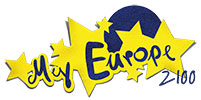“Europe, we are ready for your votes,” said the presenter, the words Eurovision Song Contest 2030 glowing on the screen behind her. The crowd cheered, and my stomach lurched with nerves. This was important to me, more than it was to anyone else. It was about more than just the music and the spectacle. It was about my country, and how I was the one it had chosen to represent it. Especially since, when I had first come to Ireland, I hadn’t felt represented at all.
“This is only temporary,” I could hear our case worker’s voice as if she was beside me, the hint of guilt and pity in her otherwise welcoming voice. “We’re working on processing your files. We’ll do it as fast as we can”. She had gestured to the files under her arms, titled Direct Provision. I hadn’t known what that meant.
Our room was small and bare, with camp beds and mattresses covering almost the entire floor. “It’ll be just like camping,” said my sister excitedly, sitting on her mattress and taking in our new surroundings. “We can stay up late telling stories and get take out every night”. The hostel in Dublin lost its little romance all too quickly. The room I shared with 5 of my family had no kitchen, and we shared a bathroom with the three other families of our floor. Our home was a room, our childish play wishful thinking: any day now, they’d give us a little piece of paper, and we’d be Irish. Mum and Dad would be able to get jobs, and buy a house, and someday, those little pieces of paper would give us the power to see France and Germany and Greece and eat interesting food and walk through famous streets. Day after day, we talked about the pieces of paper that meant freedom.
Day after day, freedom did not come.
“Samara, the camera!” my sister whispered, and I looked forward. The camera was taking a panning shot of the contestants. It passed The Ukranian contestant, a very sweet Crimean boy who sang and played violin; The Russian act, a romantic duet by a couple named Anna and Maria; Team Scotland, who were enjoying their own Eurovision entry as a perk of Devo Max. As it came closer to my group and I, we began to sing my song, jumping up and down, waving Irish flags excitedly. The green, white and orange surrounded me as I sang to the voters, and I felt a surge of pride for my country.
“It’s not our country, Samara,” my sister had said. It was St. Patrick’s Day, 2016, three years after we’d first come to Ireland, and I was trying to work some green into my outfit – my favourite turquoise nail varnish, and a shoelace that I’d found on the bus once, that I was working into my hair. “Of course it is,” I’d replied distractedly. “it’s where all of our friends are. It’s where our life is”. “That doesn’t mean we need to put shoelaces in our hair and stick shamrocks to our shirts” she said, her disgust obvious. “What’s wrong with shamrocks?” She looked at me sadly, her voice pleading. “We’ve been living in a hostel for Three Years Samara! We can’t get jobs or do anything without getting deported, they give us twenty five euros a week to live on! I used to spend that much on lunch.” “So? What’s your point?” I was angry now. I just wanted to dress up and go out like everyone else. Why did she have to ruin that? Her response shook me. “Why do you want to love a country that doesn’t love you back?”
The points giving was wild. On either side of me, the Greeks and the Lithuanians hugged and congratulated me when I was awarded points, and I did the same for them. My sister sat with her children, a flag in her hand and her nails painted green. I thought about that day back in 2016, when we’d felt like outsiders. I thought about the year that it got easier, that council houses were set up for families like mine, that we got our pieces of paper, that being Irish became easier for people like me. I thought about the day I used that piece of paper to get on a plane, and how good that felt.
I thought about how the Eurovision, and Europe, are not about a big story, but about a bunch of little cultures and stories coexisting. I thought about how long I felt that stories like mine would never be included.
Mostly, I thought about the crowd screaming my name. The Country, and the Union, that I loved, and that I could finally say loved me back.
